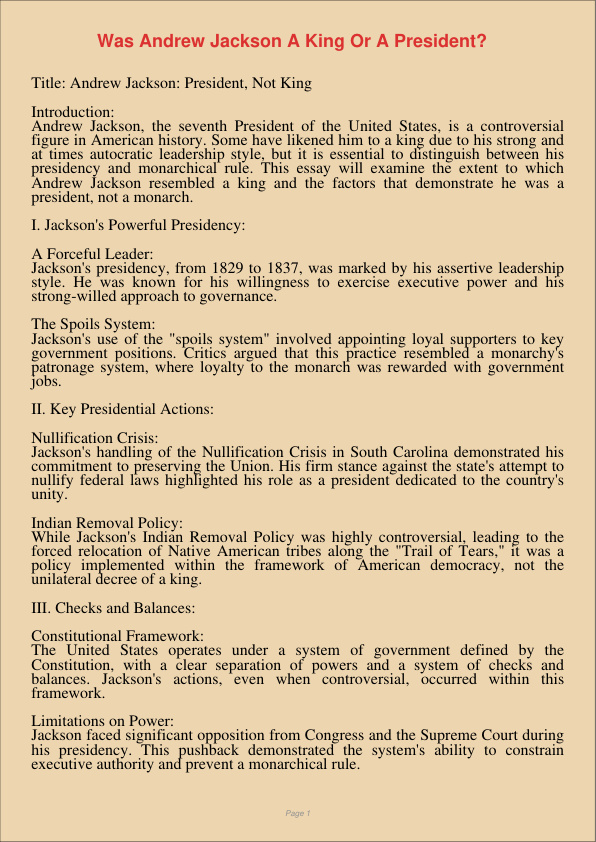Was Andrew Jackson A King Or A President
Jan 8, 2024
andrew jackson
president
Health Sciences & Medicine
Nursing
Title: Andrew Jackson: President, Not King
Introduction: Andrew Jackson, the seventh President of the United States, is a controversial figure in American history. Some have likened him to a king due to his strong and at times autocratic leadership style, but it is essential to distinguish between his presidency and monarchical rule. This essay will examine the extent to which Andrew Jackson resembled a king and the factors that demonstrate he was a president, not a monarch.
I. Jackson’s Powerful Presidency:
A Forceful Leader: Jackson’s presidency, from 1829 to 1837, was marked by his assertive leadership style. He was known for his willingness to exercise executive power and his strong-willed approach to governance.
The Spoils System: Jackson’s use of the “spoils system” involved appointing loyal supporters to key government positions. Critics argued that this practice resembled a monarchy’s patronage system, where loyalty to the monarch was rewarded with government jobs.
II. Key Presidential Actions:
Nullification Crisis: Jackson’s handling of the Nullification Crisis in South Carolina demonstrated his commitment to preserving the Union. His firm stance against the state’s attempt to nullify federal laws highlighted his role as a president dedicated to the country’s unity.
Indian Removal Policy: While Jackson’s Indian Removal Policy was highly controversial, leading to the forced relocation of Native American tribes along the “Trail of Tears,” it was a policy implemented within the framework of American democracy, not the unilateral decree of a king.
III. Checks and Balances:
Constitutional Framework: The United States operates under a system of government defined by the Constitution, with a clear separation of powers and a system of checks and balances. Jackson’s actions, even when controversial, occurred within this framework.
Limitations on Power: Jackson faced significant opposition from Congress and the Supreme Court during his presidency. This pushback demonstrated the system’s ability to constrain executive authority and prevent a monarchical rule.
IV. Legacy of a President:
The End of Jackson’s Presidency: Jackson’s presidency came to an end in 1837, as he adhered to the democratic process and peacefully transferred power to his successor, Martin Van Buren. This act reinforced the idea that he was a president, not a monarch.
Democratic Values: Jackson’s promotion of democratic principles, including expanded suffrage and a government more responsive to the common people, aligns with the role of a president in a democratic republic.
Conclusion:
While Andrew Jackson’s strong leadership style and use of the “spoils system” have led some to draw comparisons between him and a monarch, it is essential to acknowledge the distinctions between his presidency and monarchical rule. Jackson operated within the constitutional framework of the United States, faced opposition from other branches of government, and adhered to democratic principles. Ultimately, he was a president, not a king, and his legacy in American history should be considered within the context of the nation’s democratic traditions and system of government.
